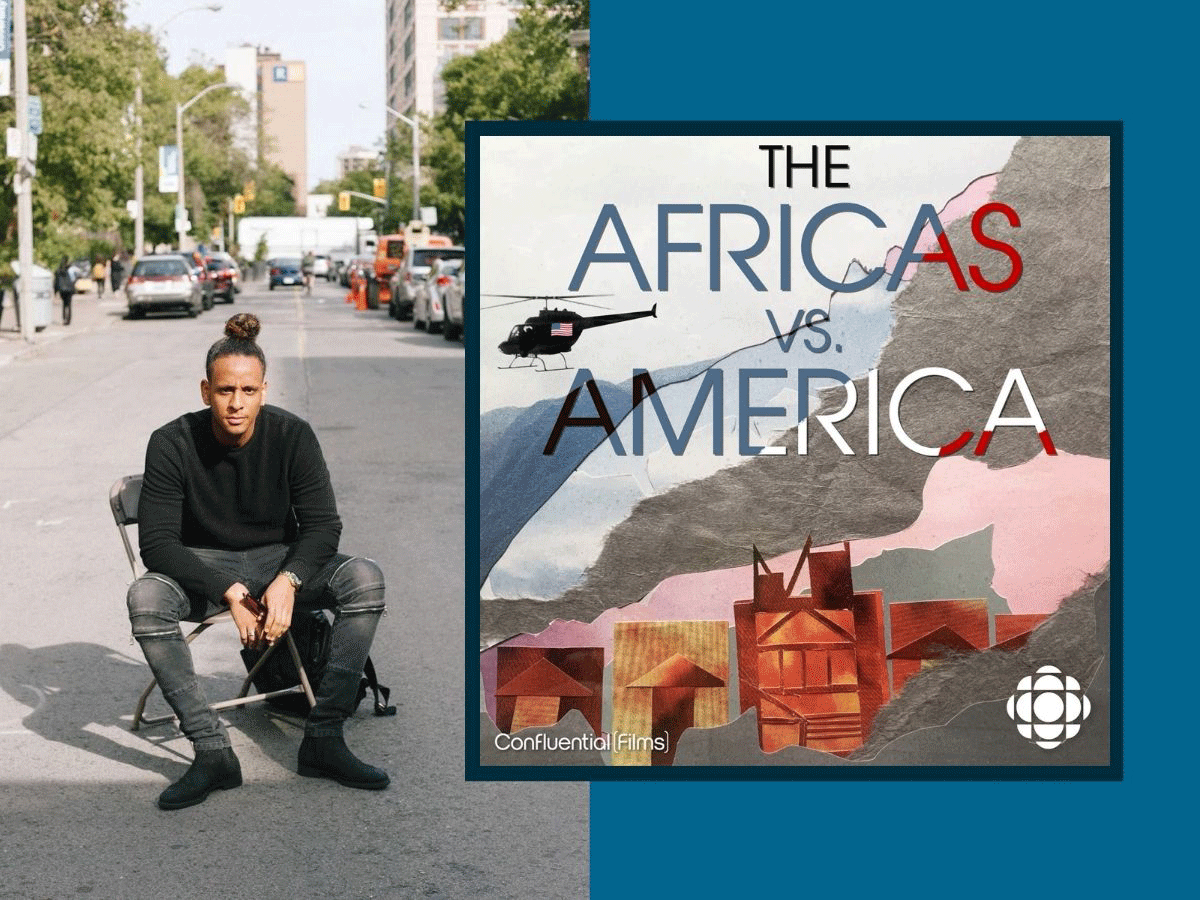Matthew Amha, ‘18, hopes his latest podcast will help humanize stories of violence
Matthew Amha’s latest podcast, The Africas VS. America (external link) explores the aftermath of the MOVE bombing, one of the deadliest uses of police force in U.S. history. The ‘18 alum wants listeners to challenge their perceptions of activism and learn about the impact of this tragedy, beyond the headlines.
“I think that people listening will come to interrogate the historical record, and really develop a more sophisticated sense of history,” he says.

(Photo courtesy of Augustine Ng and CBC Podcasts)
When the Philadelphia police dropped a bomb (external link) on the home of a Black liberation group, MOVE in May 1985, 11 members were killed, five of which were children.
The MOVE organization was founded in 1972 and still exists today (external link) , and yet many do not know about the bombing that took place and its long lasting effects, one being that 61 homes were destroyed and more than 250 citizens were left homeless.
Amha says, “It's one thing to understand something intellectually, it's another thing to get on the ground level, and to understand it as a human being … to understand it on an experiential level.”
He traveled to Philadelphia to recover and document the experiences of members of the organization and the larger community. He was surprised to find that many people had zero recollection of the bombing. Amha decided to confront that hole in people's memory.
Interviewing community members in Philadelphia proved to be difficult at first for many reasons. Amha, as a Black and Canadian journalist, expected some distance and resistance because of the hostile relationship that many in the community have with journalists and the media. Often, different news organizations would repurpose and repackage existing stereotypes about the group or steal their stories, Amha says.
“The reporting process comes with a serious responsibility,” he says, “The MOVE organization for a long time has had a kind of combative relationship with the media, because of the way that they have been characterized.”
His reporting was through a trauma-informed lens, meaning not everything needs to be the subject of a story, especially parts of interviews that seemed too raw to include.
.png)
(Photo courtesy of Jessica Linzey)
“We didn't want to go with the whole ‘if it bleeds, it leads’ perspective on this whatsoever,” he says, “If I'm going to do this, I'm going to do this the right way … … unless you are willing to really invest yourself in an ethical process, it’s really not going to be worth my time.”
He spent half a year building trust with several members of MOVE and their families. He spent another six months recording and editing to produce the podcast series.
“The best journalism involves tons of hours of work that listeners and readers will never really understand … so much of the most important stuff that we do happens off camera, it isn't reflected in the actual copy, but it's what makes the copy so good,” Amha says.
A challenging part of producing this show was choosing what to include, as this story takes place across a spectrum of almost 50 years and is still active.
“Every juncture of American history has been marked by an effort to whitewash, erase or criminalize Black history in some way,” says Amha, “the hope is that people will come to kind of … challenge some of the cliches that typically attend discussions of MOVE, the cliches about violent and angry Black activists.”
Police violence in racialized and marginalized communities has always been prevalent, but only in the last couple of years have certain cases of violence been brought to mainstream attention.
Amha is hoping the podcast will disrupt the way violence is portrayed, churning through the news cycle.

(Archival photos of the MOVE group, photographed on various dates. Photos courtesy of Confluential Films, partners on the podcast)
“Often we have these viral images of death and murder at the hands of the state, with unarmed Black people in the street, and what we have are these kinds of media spectacles that typically last a week and a half and then everybody moves on,” he says, “I think this will give listeners an opportunity to like to look beyond the headline, and to actually sit with a real, tangible, flesh and blood example of what state violence in the West can actually look like.”
He wants listeners to learn about MOVE, know what activism actually means, understand what change costs and to question their own existing preconceived conceptions.
As a journalism student, Amha founded a multi-media, online magazine for young people, called Yonge Magazine. When he graduated, he was awarded a CBC Joan Donaldson (external link) Scholarship.
For students who are looking to do similar work in the future, specifically students who come from a marginalized or minority background, his advice is, “Do not allow people to make you feel like you do not have a place [at this school], create your own table.”
You can listen to the full podcast, The Africas VS. America, here (external link) .
